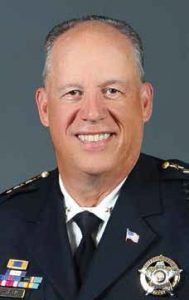Español Français Português عربى |

Any officers who violate their oath of office have no place in our agencies. They betray their fellow officers and tarnish the reputation of a profession that is dedicated to protecting the public and preserving the sanctity of life.
Collectively, we have a real challenge ahead. Mr. Floyd’s death is a painful reminder to all who strive for justice that significant work remains before us. While the focus is policing, it will take all of us to develop and implement systemic solutions to build safer, more just communities.
Policing has made significant advancements over the years; there is no question about that. Police leaders have acknowledged the issues of the past and have sought out community partners to build a better future. Agencies have worked hard to increase transparency, revise policies to enhance procedural justice, recruit and hire officers who reflect the communities they serve, reduce use-of-force incidents, and focus on eliminating police cultures that prevent officers from holding each other accountable.
Despite these tremendous advances, there is a call for more. The profession is embracing the concerns and criticisms and reexamining policies and approaches. We are committed to working tirelessly to earn and keep the trust of our communities.
I cannot stress enough that the answer to the solutions sought by many elected officials and community members is not to “defund the police” or shift resources away from the police.
Change will require both dedicated resources and an enduring commitment from police leaders, community members, and elected officials. Now is not the time to further limit the capacity of police agencies.
Change will require both dedicated resources and an enduring commitment from police leaders, community members, and elected officials.
The issues in our criminal justice system extend well beyond the behavior of police. Over the years, reductions in state and local budgets have slashed funding for mental health, homelessness, and substance abuse and recovery services; offender reentry programs; educational and vocational training; and programs that promote economic improvement.
By default, police agencies have been required to fill the void created by these funding cuts. The “defunding” of these social services means that the police are often the only ones left to call. Although we are training our officers in crisis intervention and mental health first aid, this does not take the place of proper medical treatment.
While I agree that social services, education, and mental health services need additional resources, fulfilling this need should not come at the expense of police funding. By the very nature of the profession, law enforcement remains the only entity of government that consistently and constantly responds to every situation where immediate help is needed.
Successfully moving forward will require a comprehensive, nuanced, determined, and informed policy effort that will involve all aspects of society. This solution will not be simple or cheap, but it is what is necessary to effectively address the challenges that confront us. As the discussions regarding police reform continue, I offer the following framework of key policy considerations.
First, the United States should adopt the National Consensus Policy on Use of Force developed by a broad coalition of law enforcement leadership and labor organizations.
The National Consensus Policy on Use of Force makes clear that it is the policy of U.S. law enforcement agencies to value and preserve human life and that they should develop policies and training practices that focus on de-escalation and the application of force only when necessary.
The policy states that officers should only use force when no reasonable alternative appears to exist, they should use that force for only as long as it is necessary to bring a situation under control, officers should provide the necessary medical treatment once it is safe to do so, and all officers have the duty to intervene to prevent or stop the use of excessive force by another officer.
Police agencies should be required to participate in the FBI’s National Use of Force Database. This should no longer be a voluntary effort.
In addition, there is a need to develop national standards and policies for the discipline and termination of officers to establish uniformity and a gold standard of excellence and to prevent incompetent and dishonorable individuals from remaining in the profession.
There needs to be the development of a national database of decertified police officers, which will aid law enforcement agencies in making informed hiring decisions and prevent officers who have been terminated or decertified from being able to go to another state to be hired.
Police leaders must prioritize diversity and create a culture of equity and inclusion by working to eliminate racial, ethnic, and gender bias in the workplace, adopting procedural justice and bias-free policing as core values, and providing communities with a role in the review and development of departmental policies and procedures.
Additionally, educational standards, background investigations, targeted recruitment efforts, and hiring practices should be standardized across agencies. Uniform national training standards need to be developed so that police leaders, elected officials, and communities can be confident that their officers are trained to a consistent and acceptable standard.
 Finally, labor agreements, and civil service rules sometimes make it difficult for departments to swiftly remove problematic officers. While ensuring that the due process rights of officers are respected, the authority of management in disciplinary proceedings needs to be enhanced to allow agencies to expediently discipline and terminate officers. Further, when negotiating such agreements, police leaders have a responsibility to ensure the agreement aligns with the envisioned organizational culture and community expectations.
Finally, labor agreements, and civil service rules sometimes make it difficult for departments to swiftly remove problematic officers. While ensuring that the due process rights of officers are respected, the authority of management in disciplinary proceedings needs to be enhanced to allow agencies to expediently discipline and terminate officers. Further, when negotiating such agreements, police leaders have a responsibility to ensure the agreement aligns with the envisioned organizational culture and community expectations.
While the calls for change are loud, we can’t let them affect our morale. We must never lose sight of the fact that the overwhelming majority of the men and women in the policing profession chose to become police officers in order to do good, to protect our communities, and to serve their fellow citizens. At its core, policing is a noble profession made up of individuals who have dedicated their lives—and often lost their lives—in service to the public. While we all certainly recognize and agree that changes must be made, we cannot and should not let the profession be painted with a broad brush that highlights only the bad and overlooks the immense amount of good that is done by officers in communities across the United States—and the world—every day.d
Please cite as:
Steven R. Casstevens, “The Challenge Before Us,” President’s Message, Police Chief (July 2002): 6-7.


